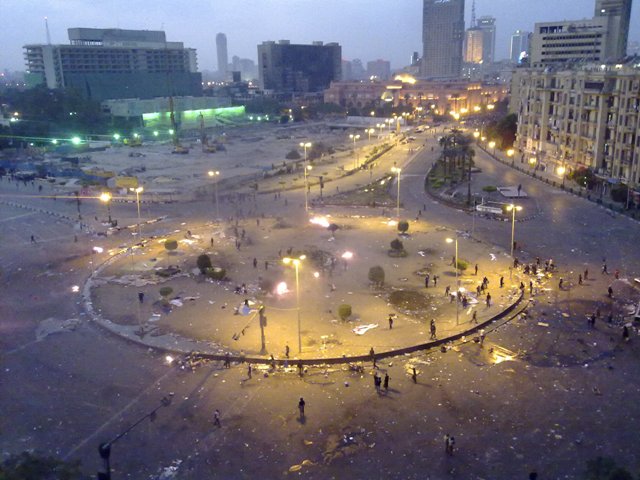
Amid fears of the upcoming parliamentary elections yielding unsatisfactory results and renewed protests in Tahrir Square, many with unmet demands believe that street politics remain their primary tool for achieving change.
Protesters’ hours-long fight with the security apparatus to regain Tahrir Square on Saturday shows a possible street politics' comeback, one that is reminiscent of the 18-day uprising of 25 January that toppled the regime of Hosni Mubarak, as some activists say.
Protesters chanted against the military council, demanding a power handover, amid a political backlash over the role the ruling Supreme Council of the Armed Forces will play in the country’s future.
Negotiations between the political forces and the Supreme Council of the Armed Forces (SCAF) have reached a stalemate over a supra-constitutional charter that at some point describes the nature of the state as “civil,” to the fury of Islamists. The charter also gives SCAF an exceptional status, which was described by some observers as “a state within a state” condition.
On the ground, many felt estranged by this conversation, which has been reserved for the political elite.
“Forget the political grandstanders. It is those in Tahrir who're now fighting so you can have your bread, justice, dignity and human rights,” wrote Sarah Badr Sunday on her Twitter newsfeed Cairowire, as Tahrir protesters continued fighting with the police force.
Similarly, the fight for the elections seems to be marginal for some, who worry that a parliament's main function would be to put an end to the street movement.
The No to Military Trials for Civilians group and the Popular Committees to Protect the Revolution, among others, have decided to distance themselves from the elections and function under the assumption that the elections will either have to be canceled or will yield a parliament that will not serve the interests of the revolution.
“How are there going to be elections with the security void that exists in the country now? And even if there are elections, they will bring a majority of National Democratic Party members,” says Mahitab El Jilani, a member of the Popular Committees to Protect the Revolution.
Confronting the rising power of the interim rulers, namely the Supreme Council of the Armed Forces, has become a political goal in and of itself for this group and others. The No to Military Trials group has a strong commitment to human rights and is driven by memories of the police state of the toppled Mubarak regime. The group says that the some 12,000 civilians standing in military tribunals is nothing short of a regression of the revolution.
“We are still working on the demands of the revolution at the same time as the elections, there is no contradiction there. If some people want to focus on the elections they can go ahead and do it, but I see it as a big play,” says Rasha Azab, a member of the No to Military Trials group.
Many of the demands that have been put forward since January have yet to be realized, including setting a minimum and maximum wage and eliminating the Emergency Law.
The No to Military Trials group started a campaign last week titled “Free Egypt,” which consists of daily marches demanding the release of these 12,000 civilians in jail after military trials. The group’s activity has recently increased since the detainment of activist Alaa Abd El Fattah. Azab expects the group will remain busy during the elections as thugs deployed during the elections will likely be referred to military trials. Many have indicated fears that the upcoming elections will witness a fair amount of violence because there appears to be a true competition over seats, whereas in the past the regime achieved electoral victories through fraud.
Some political parties also see salvation solely in street politics. The Democratic Labor Party decided to boycott the elections altogether, considering them a distraction from the goals of the revolution. The party initiated a new campaign named after the revolution’s original chant “bread, freedom, social justice,” hoping to ensure that the revolution’s original demands are remembered and asserted throughout the electoral process.
“There is a revolution being hijacked — should we go for parliamentary seats or save the revolution?” asks Kamal Khalil, the party’s founder.
Labor movements, which have boomed in the last few months following the toppling of the former president, are as strong as ever, as the legacy of past self-serving parliaments have the workers convinced that the new parliament will not support their fight for social and economic justice.
“Why should the workers suffer silently, without proper healthcare or unable to afford education for their kids because there is something else happening?” asks Karam Saber, head of the Earth Center for Human Rights.
Saber adds that workers’ protests will continue until their demands are met regardless of any political developments, since political forces are focusing on more general demands and tend place issues of concern to workers at the bottom of their agendas.
Yet while some are dismissing the soon-to-be-elected parliament as completely useless in the realization of the revolution’s demands, parties that are taking part in the elections believe the political process works in tandem with the popular pressure of street activism, rather than replacing it.
Sherif Younes, a historian and political analyst, describes the duality of working within party politics while continuing to engage in street politics as being both defensive and offensive in the face of the military and its envisioned future configuration.
“The military should be called on to give sufficient consideration to how Egypt has changed post-revolution and to acquiesce to the public’s political and social demands. The struggle should continue, not only in a defensive sense such as with the rejection of military trials, but in an offensive one as well, which means adopting popular demands and striving to set a realistic national agenda.”




